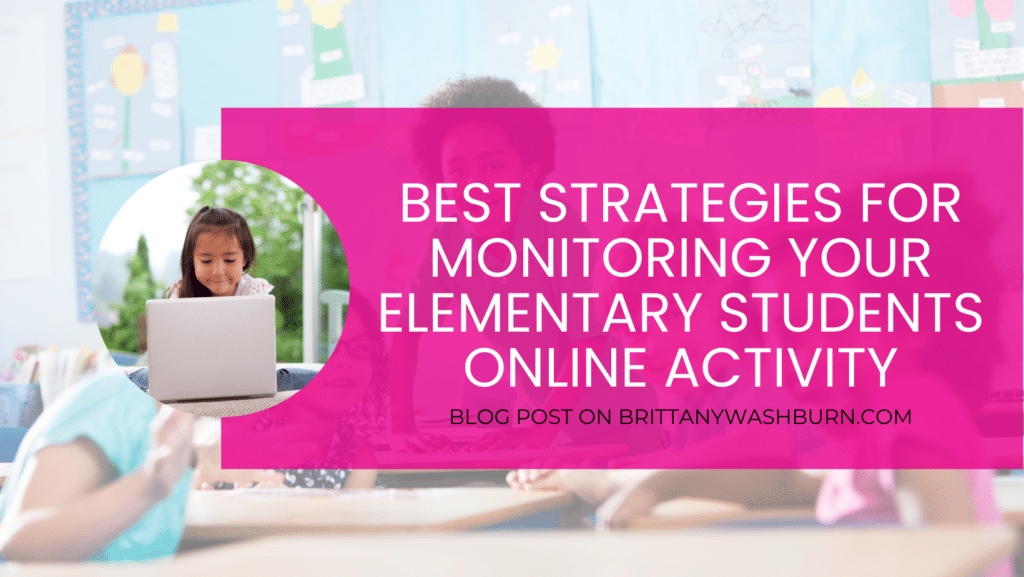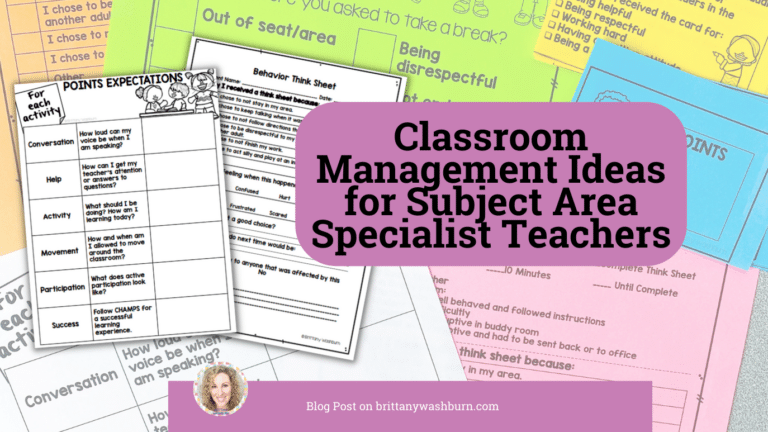Best Strategies for Monitoring your Elementary Students Online Activity

It’s no secret that elementary school students have access to the internet and online platforms for both learning and entertainment. The internet offers endless opportunities for exploration and education, but it also comes with risks such as cyberbullying, exposure to inappropriate content, and online predators. That’s why it’s crucial for parents and educators to monitor their online activity and ensure their safety. In this article, we’ll be discussing the best strategies for monitoring elementary students’ online activity. We’ll cover everything from selecting the right monitoring tool and balancing privacy and safety concerns, to engaging parents and educating students on digital citizenship and online safety. So, let’s dive in!
Understanding the Importance of Monitoring Elementary Students’ Online Activity
The internet has become an essential tool for research, communication, and entertainment, but it also poses several risks, especially for young and vulnerable children. As an educator or parent, it is crucial to monitor elementary students’ online activity to ensure their safety and well-being.
Benefits of Monitoring Online Activity
Monitoring online activity helps keep students safe from cyberbullying, inappropriate content, and online predators. By keeping track of internet usage, educators and parents can also identify warning signs of mental health issues, including depression and anxiety. Monitoring online activity can also help prevent academic dishonesty and ensure students are using the internet to enhance their learning experience.
Risks of Not Monitoring Online Activity
Failing to monitor online activity exposes students to several risks, including cyberbullying, online predators, and exposure to inappropriate content. Without monitoring, students may also waste valuable study time or engage in other unsafe online practices that may impact their mental health and overall well-being.
Setting Rules and Guidelines for Safe and Responsible Internet Use
To ensure that students use the internet safely and responsibly, parents and educators need to establish clear rules and guidelines for internet use.
Establishing Guidelines for Internet Use
Guidelines for internet use should include clear instructions on the types of websites and content that students can access, how much time students are allowed to spend online, and rules around social media and online communication.
Creating a Code of Conduct for Online Behavior
A code of conduct for online behaviour outlines the expectations for students when using the internet. This code should include rules around cyberbullying, online privacy, and respect for others’ online activity. It should also emphasize the need for students to report any inappropriate online behaviour to their educators or parents.
Choosing an Effective Monitoring Tool for Elementary School Students
Several monitoring tools can help parents and teachers monitor elementary students’ online activity.
Criteria for Selecting a Monitoring Tool
When selecting a monitoring tool, consider features such as web filtering, access control, and time management. The tool should also provide detailed reports on online activity and be compatible with multiple devices.
Overview of Popular Monitoring Tools
Popular monitoring tools include Net Nanny, Qustodio, and Norton Family. These tools offer excellent features such as content filtering, social media monitoring, and real-time alerts to help keep students safe and on track with their online activity.
Balancing Privacy and Safety: How to Monitor without Intruding
While monitoring online activity is crucial for students’ safety, it is also essential to balance their privacy needs.
Respecting Student Privacy
Parents and educators must respect students’ privacy needs and communicate the reasons for monitoring their online activity. It is also vital to offer students a degree of autonomy and trust to ensure they feel comfortable using the internet responsibly.
Effective Monitoring Strategies that Don’t Intrude on Privacy
Effective monitoring strategies include using web filtering software to block inappropriate content and setting time limits for internet usage. Regular communication between parents, educators, and students is also essential to ensure that everyone is on the same page about online safety and responsible internet use.
Engaging Parents in Monitoring Elementary Students’ Online Activity
One of the most effective ways of keeping elementary students safe online is through parental involvement. Engaging parents in the monitoring process is essential to ensure that students are using technology in a responsible and safe manner.
Benefits of Parental Involvement in Monitoring
When parents are involved in monitoring their child’s online activity, they can help identify potential online risks and intervene before these risks escalate. Additionally, parental involvement can foster open communication between parents and children, helping students feel comfortable discussing their online experiences with their parents.
Strategies for Engaging Parents in the Monitoring Process
Schools can engage parents by providing training and resources on online safety and monitoring. This can include workshops, seminars, and online resources that offer practical advice on how to monitor students’ online activity. Schools can also establish regular communication channels with parents, such as newsletters or emails, to keep them informed of any online issues affecting their children.
Responding to Inappropriate Online Behavior: Strategies for Intervention
It is important for educators and parents to be able to identify inappropriate online behavior and know how to respond effectively.
Identifying Inappropriate Online Behavior
Inappropriate online behavior includes cyberbullying, sharing personal information, and engaging in risky online activities. It is important to educate students about what constitutes inappropriate behavior and to monitor their online activity for any signs of concern.
Effective Intervention Strategies
Schools and parents should have a clear plan in place for responding to inappropriate online behavior. This may involve informing students of the consequences of their actions, involving school administrators, contacting parents, or even alerting law enforcement in some cases. It is important to have a consistent and structured approach to intervention, so that students understand the gravity of their actions and are aware of the potential consequences.
Educating Elementary Students on Digital Citizenship and Online Safety
Elementary students need to learn about online safety and digital citizenship to develop good habits and make responsible choices online.
Teaching Digital Citizenship to Elementary Students
Digital citizenship involves teaching students how to use technology responsibly, safely, and ethically. This includes topics such as online etiquette, respecting privacy, and understanding the impact of online behavior. Educators can teach digital citizenship by incorporating it into the curriculum and providing age-appropriate resources for students.
Online Safety Education for Elementary Students
Online safety education should focus on teaching students how to stay safe online and avoid potential risks. This includes topics such as safe online behavior, identifying and avoiding online predators, and responding to inappropriate behavior. Schools should incorporate online safety into their curriculum and offer resources and training to teachers and parents to reinforce these concepts.
Developing a Comprehensive Plan for Online Safety and Monitoring in Elementary Schools
A comprehensive plan for online safety and monitoring is essential to ensure that students are safe and responsible online.
Components of a Comprehensive Online Safety Plan
A comprehensive online safety plan should include policies for acceptable use of technology, guidelines for monitoring online activity, and intervention strategies for addressing inappropriate behavior. It should also include education and resources for students, parents, and educators on online safety and digital citizenship.
Implementing an Effective Monitoring Program in Elementary Schools
Schools should have a structured and comprehensive plan for monitoring students’ online activity. This may include parental involvement, monitoring software, and regular communication with students about online behavior. It is important to ensure that the monitoring program is designed to protect student privacy and is consistent with school policies and federal regulations.
In conclusion, monitoring the online activity of elementary school students is crucial to ensuring their safety in today’s digital world. By setting clear guidelines, selecting an effective monitoring tool, balancing privacy and safety concerns, and engaging parents and students, we can create a safe and responsible online environment for elementary school students. With a comprehensive approach to online safety and monitoring, we can provide students with the best opportunities for learning and exploration, while keeping them safe from online risks.

FAQ
What is the best way to monitor elementary students’ online activity?
The best way to monitor elementary students’ online activity is to use an effective monitoring tool that provides real-time updates on their online behavior, while respecting their privacy. Additionally, establishing clear guidelines and rules for responsible internet use, educating students on digital citizenship and online safety, and engaging parents in the monitoring process can help ensure the safety and security of elementary school students while using the internet.
Is it possible to monitor elementary students’ online activity without intruding on their privacy?
Yes, it is possible to monitor elementary students’ online activity without intruding on their privacy. By choosing an effective monitoring tool that respects students’ privacy and using monitoring strategies that do not invade their personal space, parents and educators can monitor students’ online behavior without compromising their privacy.
What should I do if I notice inappropriate online behavior from an elementary school student?
If you notice inappropriate online behavior from an elementary school student, it is important to intervene immediately. Effective intervention strategies include addressing the behavior with the student, contacting parents, and reporting the behavior to school administrators or law enforcement if necessary.
How can I educate elementary school students on digital citizenship and online safety?
To educate elementary school students on digital citizenship and online safety, it is important to incorporate these topics into the curriculum and provide students with age-appropriate resources and activities. Additionally, modeling safe and responsible online behavior and engaging parents in the education process can help reinforce these important lessons.

Top 8 Apps and Programs for Streamlining Classroom Management and Assessment
The integration of technology has become the underpinning which supports teachers as they manage their…
5 Ways to Incorporate Technology into Daily Classroom Routines
Chromebook Care Tips for Teachers
Elgin, IL – 04/02/2020: A chromebook being used at home for a remote classroom during…
PBIS-Friendly Consequences
PBIS stands for Positive Behavior Interventions and Supports. It is an approach that is usually…
Tips for Helping Students with Disabilities Get the Most Out of Your Gen Ed Tech Class
Students have such a wide range of abilities that it can be very challenging to…
Flexible seating guide for computer lab teachers
Incorporating flexible seating in computer labs has been gaining popularity among educators who seek to…












